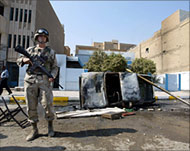Turkish troops issue proves divisive
The United States has welcomed Turkey’s decision to send soldiers to Iraq, dismissing clear objections from Iraq’s interim leadership that Washington itself installed.

In contrast, ministers from Iraq’s Governing Council have roundly criticised the Turkish move.
And there is unease in Turkey itself. Polls indicate most Turks are opposed to their country sending its forces to serve in Iraq.
The White House and State Department on Tuesday said Washington was pleased with the Turkish parliament’s approval of the plan, saying Turkish troops in Iraq would help stabilisation efforts.
“We welcome that decision and we will be working with Turkish officials on the details of their decision,” White House spokesman Scott McClellan said.
|
“The United States believes that Turkish troops would contribute to stability in Iraq” Richard Boucher, |
At the State Department, spokesman Richard Boucher echoed those remarks, adding: “The United States believes that Turkish troops would contribute to stability in Iraq.”
Secretary of State Colin Powell called his Turkish counterpart Abdullah Gul “to say we appreciate the decision that was taken”, a State Department official said.
But a recent survey revealed more than 72% of Turks oppose sending troops to war-torn Iraq. About 100 people demonstrated in Ankara on Tuesday in front of the headquarters of the party of Prime Minister Recep Tayyip Erdogan.
Iraqi ministers object
In Iraq, the US-appointed Governing Council unanimously adopted a resolution opposing a Turkish troop deployment.
“The council is unanimous in issuing a communique against the sending of Turkish forces to Iraq,” said council member Mahmud Othman in Baghdad. “It is the wrong thing to do. It does not add to security.
|
“(The) Governing Council does not want any of Iraq’s immediate neighbours to take part in peacekeeping missions” Hoshyar Zibari, |
“It is not useful,” said Othman, whose Kurdish ethnic group has a long history of bad blood with the Turks. “This is our (the council’s) position and it is unanimous.”
Iraqi Foreign Minister Hoshyar Zibari said the “Governing Council does not want any of Iraq’s immediate neighbours to take part in peacekeeping missions.”
However, an expected formal announcement of the council’s communique was not immediately forthcoming, prompting speculation that the US-led occupation authority had either delayed or squelched it.
Elsewhere, officials of Kurdish groups governing the north of Iraq have also criticised the prospect of a Turkish military deployment.
Diplomatic calculations
The Turkish parliament has voted overwhelmingly in favour of sending troops to Iraq in what is seen as a way to make up for its refusal on 1 March to allow its territory to be used as a springboard to attack Iraq.
 |
|
US has urged others to bolster its |
The government, backed by the army, believes military involvement will give Ankara a future say in Iraq and the region, and will convince the US to take action against 5000 Turkish Kurd rebels hiding in northern Iraq.
In addition, economically-challenged Turkey has negotiated loans of $8.5 billion from Washington, an aid which is believed to be contingent on Turkey’s cooperation with the US. However, Washington has denied the loans depend on the sending of Turkish troops.
Ankara’s decision limits the deployment of up to 10,000 troops to one year, but does not specify to which part of Iraq they will go.
Once the deployment goes ahead, Turkey will be the third mainly Muslim country to send troops to Iraq, after Azerbaijan and Kazakhstan. Its forces will join more than 155,000 troops from 34 countries, with the United States providing the vast majority of soldiers.